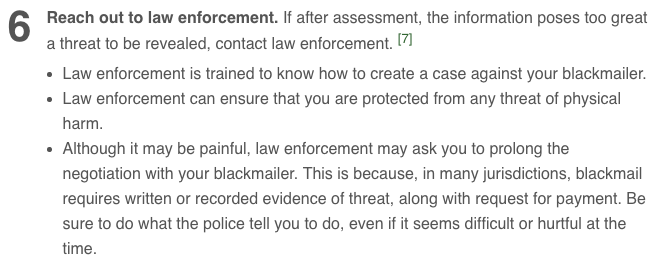What To Do If Someone Tries To Blackmail You
It’s good to be prepared!

My latest viewing obsession is the British import “Happy Valley,” which is a crime drama with a sense of humor starring the phenomenal Sarah Lancashire as Police Sergeant Catherine Cawood in a down-at-heel community, as well as O’Brien and Molesley from “Downton Abbey,” both of whom are fun to goggle at out of period costume. My one complaint is that Netflix should offer subtitles, since I can’t understand half of the dialogue. Even that doesn’t really matter, though. The acting and direction are so good the thing could function as a silent film. (OK, my one other complaint is that characters are always asking each other if they want some tea. It feels like satire after a while, except they’re so straight-faced about it.)
Season One is an English take on Fargo, a kidnapping and ransom plot gone awry. It’s so intense I ended up weeping onto my infant’s head. He’s fine. Children are resilient. Season Two, though, foregrounds an attempted blackmail, and that got me thinking. Pop culture properties from the great Sayers’ mystery novel Busman’s Honeymoon to the always quotable Clue abound with vivid examples of what not to do if someone tries to blackmail you. Don’t: freak out, strike back, or pay up. Don’t panic, basically. Fine. But what should you do if a person approaches you with incriminating pictures and demands, say, $1,000 a month not to send those pictures to everyone in your address book?
My instinct is to draw wisdom from yet another movie of my childhood and say, Shoot the hostage. In this case, your reputation is the hostage. If someone has something on you and they’re threatening to release it unless you can come up with regular sums of money, your best recourse may well be to release the information first. Get ahead of the story; pretend it doesn’t matter. Hell, in this age of living large on social media, maybe it doesn’t matter, or at least not as much as you assume it will. Don’t most people in the public eye outlive their tawdriest scandals? At least unless their last name is Weiner.
That is WikiHow’s advice, too: “assess the grounds” and figure out “what’s the worst that can happen.” Might you lose your job, your scholarship, or something else of real value if the information came out, or merely some status? If your job or scholarship is in peril, is there some way you can secure it? Or else figure out what to do without it?
WikiHow also recommends keeping documentation of everything and going to the police for legal reasons.

This would be easier to do for many of us if we believed most police officers were more like Sergeant Cawood and less like Timothy Loehmann. It takes a certain amount of trust to go to the police, and that trust can be sorely lacking these days.
However frightened you are, several sources I’ve consulted say to try to keep the blackmailer from thinking you’re scared. Apparently blackmail, like rape, is about control: the other party wants to feel powerful at your expense. It will help if you don’t let yourself feel isolated and alone, despite the temptation to. Reach out to other people. If you can’t face the police at first, confide in someone you trust.
All of this is easier said than done, of course. Still, it’s good to have a game plan. Just in case.
Support The Billfold
The Billfold continues to exist thanks to support from our readers. Help us continue to do our work by making a monthly pledge on Patreon or a one-time-only contribution through PayPal.
Comments